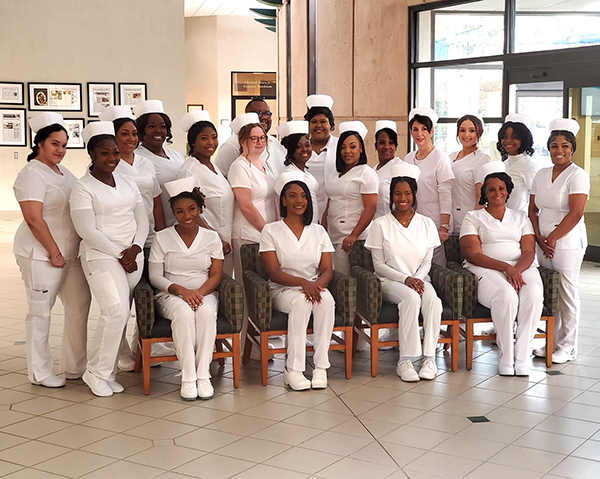Savannah Tech celebrates Practical Nursing Graduates
 SAVANNAH, Ga. – Twenty students from the Savannah Technical College Practical Nursing cohorts celebrated graduation with a recent ceremony.
SAVANNAH, Ga. – Twenty students from the Savannah Technical College Practical Nursing cohorts celebrated graduation with a recent ceremony.
Ten of these graduates have jobs, and others are in the process of securing employment. This graduating class includes STC’s first night cohort for Practical Nursing along with daytime students.
The capping and pinning ceremony occurs at the end of a student’s program in a school of nursing and signifies the completion of this level of education and official initiation into the profession. More than a tradition, capping and pinning are symbols of the nursing student’s hard work and dedication to their course, practice, and clinicals.
STC’s Practical Nursing is a competitive admission program that prepares graduates to give competent nursing care. This includes selected academic and occupational courses (Health Care Assistant/Nurse Aide) providing a variety of techniques and materials necessary to assist the student in acquiring the needed knowledge and skills to give competent care. Students participate in a variety of clinical experiences to integrate theory with practice under the guidance of the clinical instructor.
Program graduates have the qualifications of an entry-level practical nurse. Satisfactory completion of all program courses may entitle a student to participate in the NCLEX-PN examination and licensure process to be a licensed practical nurse (LPN). Practical Nursing diploma graduates had a 100% placement rate in field AY2022.
Practical Nursing is offered at the Savannah and Liberty campuses. For more information about the Health Care Assistant, Nurse Aide or Practical Nursing visit www.savannahtech.edu/LPN.
Apply today to start pre-requisites for Practical Nursing. The next cohort begins in January 2024.
# 2420 | December 19, 2023
Savannah Technical College serves Coastal Georgia with quality, market-driven technical education with campus locations in Chatham, Effingham and Liberty Counties. Serving more than 10,000 credit and non-credit students annually, Savannah Tech offers nearly 150 different instructional programs in Aviation Technology, Business and Professional Services, Industrial Technology, and Health Sciences in addition to Adult Education classes, industry-specific training and continuing education. The College serves as an economic and community development partner for the region, offering corporate and customized training and assessment programs for business and industry.
Savannah Technical College is accredited by the Southern Association of Colleges and Schools Commission on Colleges (SACSCOC) to award associate degrees, diplomas and technical certificates of credit. Questions about the accreditation of Savannah Technical College may be directed in writing to the Southern Association of Colleges and Schools Commission on Colleges at 1866 Southern Lane, Decatur, GA 30033-4097, by calling (404) 679-4500, or by using information available on SACSCOC’s website (www.sacscoc.org).
 SAVANNAH, Ga. – Twenty students from the Savannah Technical College
SAVANNAH, Ga. – Twenty students from the Savannah Technical College